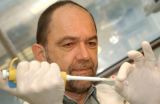With HMGB1's help, cells dine in
2010-09-06
(Press-News.org) Like some people, cells eat when they are under pressure—but they consume parts of themselves. A multi-function protein helps control this form of cannibalism, according to a study in the September 6 issue of the Journal of Cell Biology (www.jcb.org).
Cells often respond to hunger or stress by digesting some of their contents. The process, known as autophagy, helps free nutrients and clean up cytoplasmic trash such as worn-out organelles and misshapen proteins. A team led by researchers at the University of Pittsburgh Cancer Institute discovered a link between this form of cellular recycling and the protein HMGB1. The team showed HMGB1 to be a critical pro-autophagic protein that enhances cell survival and limits programmed cell death.
The findings suggests that blocking HMGB1 could benefit cancer patients, since tumor cells often rev up autophagy to withstand chemotherapy, immunotherapy, and radiation treatment.
INFORMATION:
About The Journal of Cell Biology
Founded in 1955, The Journal of Cell Biology (JCB) is published by The Rockefeller University Press. All editorial decisions on manuscripts submitted are made by active scientists in conjunction with our in-house scientific editors. JCB content is posted to PubMed Central, where it is available to the public for free six months after publication. Authors retain copyright of their published works and third parties may reuse the content for non-commercial purposes under a creative commons license. For more information, please visit www.jcb.org.
Tang, D., et al. 2010. J. Cell Biol. doi:10.1083/jcb.200911078.
[Attachments] See images for this press release:

ELSE PRESS RELEASES FROM THIS DATE:
2010-09-06
Cancer is a difficult disease to treat because it's a personal disease. Each case is unique and based on a combination of environmental and genetic factors. Conventional chemotherapy employs treatment with one or more drugs, assuming that these medicines are able to both "diagnose" and "treat" the affected cells. Many of the side effects experienced by chemotherapy patients are due to the fact that the drugs they are taking aren't selective enough. For instance, taking a drug that targets fast-growing tumor cells frequently results in hair loss, because cells in the ...
2010-09-06
The recession is finally taking its toll on national, state and local unionization rates, according to UCLA's annual report on organized labor.
Following an uptick last year, unionization rates fell between July 1, 2009, and June 30, 2010, by just more than half a percentage point in California and by a full percentage point in the five-county Los Angeles metropolitan area, researchers at UCLA's Institute for Research on Labor and Employment (IRLE) found.
"Given the duration and depth of the recession, it was inevitable that union jobs would be hit," said Lauren ...
2010-09-06
Plaque-causing bacteria can jailbreak from the mouth into the bloodstream and increase your risk of heart attack says a scientist at the Society for General Microbiology's autumn meeting in Nottingham.
Professor Howard Jenkinson, from the University of Bristol explains how oral bacteria can wreak havoc if they are not kept in check by regular brushing and flossing. "Poor dental hygiene can lead to bleeding gums, providing bacteria with an escape route into the bloodstream, where they can initiate blood clots leading to heart disease," he said.
Streptococcus bacteria ...
2010-09-06
Selfish bacterial cells that act in their own interests and do not cooperate with their infection-causing colleagues can actually reduce the severity of infection.
The selfish behaviour of these uncooperative bacteria could be exploited to treat antibiotic-resistant infections, according to research being presented at the Society for General Microbiology's autumn meeting today.
Bacteria work together by using a well-studied communication system called Quorum Sensing (QS). During infection, bacteria talk to each other using QS to coordinate the release of toxins.
Researchers ...
2010-09-06
While we are often exposed to bacteria in our food which could cause food poisoning, we don't always become ill - why should this be so?
Professor Colin Hill who is presenting his work at the Society for General Microbiology's autumn meeting in Nottingham today describes how bacteria use different tricks to aid their survival inside the body, helping to explain why food poisoning can be so unpredictable.
One of the biggest challenges faced by food-borne bacteria is acid. Acidic conditions, particularly in the stomach and in the gut will kill most microbes found in contaminated ...
2010-09-06
TORONTO, ON - Widespread reports of a decline in the population of bees and other flower-visiting animals have aroused fear and speculation that pollination is also likely on the decline. A recent University of Toronto study provides the first long-term evidence of a downward trend in pollination, while also pointing to climate change as a possible contributor.
"Bee numbers may have declined at our research site, but we suspect that a climate-driven mismatch between the times when flowers open and when bees emerge from hibernation is a more important factor," says James ...
2010-09-06
STOCKHOLM (6 September 2010)—Against a backdrop of extreme weather wreaking havoc around the world, a new report warns that increasingly erratic rainfall related to climate change will pose a major threat to food security and economic growth, especially in Africa and Asia, requiring increased investment in diverse forms of water storage as an effective remedy.
"Millions of farmers in communities dependent on rainfed agriculture are at risk from decreasing and erratic availability of water," said Colin Chartres, director general of the Sri Lanka-based International Water ...
2010-09-06
CAMBRIDGE, Mass. -- Plants are good at doing what scientists and engineers have been struggling to do for decades: converting sunlight into stored energy, and doing so reliably day after day, year after year. Now some MIT scientists have succeeded in mimicking a key aspect of that process.
One of the problems with harvesting sunlight is that the sun's rays can be highly destructive to many materials. Sunlight leads to a gradual degradation of many systems developed to harness it. But plants have adopted an interesting strategy to address this issue: They constantly break ...
2010-09-06
SANTA CRUZ, CA--A tiny optical device built into a silicon chip has achieved the slowest light propagation on a chip to date, reducing the speed of light by a factor of 1,200 in a study reported in Nature Photonics (published online September 5 and in the November print issue).
The ability to control light pulses on an integrated chip-based platform is a major step toward the realization of all-optical quantum communication networks, with potentially vast improvements in ultra-low-power performance. Holger Schmidt, professor of electrical engineering in the Baskin School ...
2010-09-06
One of the key drivers of human evolution and diversity, accounting for changes that occur between different generations of people, is explained by new research published today (Sept 5) by world-renowned scientist Professor Sir Alec Jeffreys, who discovered DNA fingerprinting at the University of Leicester.
Professor Jeffreys has spent over two decades since his landmark discovery in 1984 investigating what he describes as "pretty bizarre bits of DNA" - highly variable repeated parts of DNA called 'minisatellites' - found in the human genome. Sir Alec observed that ...
LAST 30 PRESS RELEASES:
[Press-News.org] With HMGB1's help, cells dine in




